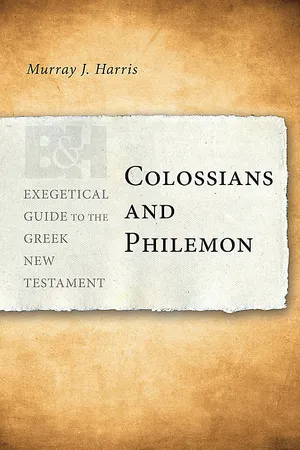
- 304 pages
- English
- ePUB (mobile friendly)
- Available on iOS & Android
Colossians and Philemon
About this book
The Exegetical Guide to the Greek New Testament: Colossians and Philemon is the first book in a projected series of twenty volumes that seeks to bring together classroom, study, and pulpit by providing the student or pastor with the information needed to understand and expound the Greek text of the New Testament. Author Murray J. Harris aims to close the gap between grammatical analysis and exegesis, leading the reader into an in-depth understanding of the New Testament Greek text by guiding him or her through the processes of thorough exegesis flowing into sermon construction.
Each volume provides the following for the biblical book or books on which it is written:
• Brief introduction on authorship, date, occasion, and purpose
• List of recommended commentaries
• Extensive exegetical notes
• Translation and expanded paraphrase of the whole book
• Comprehensive exegetical outline
• Glossary of grammatical and rhetorical terms
Frequently asked questions
- Essential is ideal for learners and professionals who enjoy exploring a wide range of subjects. Access the Essential Library with 800,000+ trusted titles and best-sellers across business, personal growth, and the humanities. Includes unlimited reading time and Standard Read Aloud voice.
- Complete: Perfect for advanced learners and researchers needing full, unrestricted access. Unlock 1.4M+ books across hundreds of subjects, including academic and specialized titles. The Complete Plan also includes advanced features like Premium Read Aloud and Research Assistant.
Please note we cannot support devices running on iOS 13 and Android 7 or earlier. Learn more about using the app.
Information
Table of contents
- Exegetical Guide to the Greek New Testament
- General Introduction
- Abbreviations
- Preface to the First Edition
- Preface to the Second Edition
- Introduction
- I. Introduction
- II. Christ’s Work and Paul’s Mission
- III. Error and Its Remedy
- IV. Exhortation to Holiness
- V. Personal Notes
- Translation
- Expanded Paraphrase
- Exegetical Outline
- Introduction
- Translation
- Expanded Paraphrase
- Exegetical Outline
- Glossary of Grammatical and Rhetorical Terms